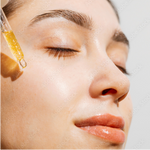
How to keep skin firm
Facial skin: how to limit the loss of firmness and volume?
With age, skin experiences several signs of aging. In addition to the appearance of wrinkles and pigment spots, it also slackens and loses firmness and volume. But what causes this loss of firmness and volume, and how can it be addressed? Here are some answers.
Why does skin lose its firmness?
Sagging facial skin is a real concern for the majority of women in France. According to figures reported by Top Santé magazine, this phenomenon affects 53% of French women over the age of 15 and 81% of those over 50. In the long term, it gives rise to numerous unsightly effects, including the loss of facial contours, hollowing and sagging of the cheeks and temples, the appearance of jowls and a double chin, and the general "verticalization" of features. In addition, wrinkles become increasingly apparent.
The natural process of skin aging is the main cause of the loss of skin firmness and volume . Indeed, as we age, facial fats shift and muscles become less and less toned. In addition, the natural hydration of the skin becomes more difficult, as does cell renewal. Added to this is the decline in the natural production of the essential elements for skin firmness and quality, namely ceramides, collagen , elastin fibers and hyaluronic acid.
However, sagging facial skin can also be caused by external factors. This is particularly the case with menopause. During this period, which occurs around the age of fifty, various hormonal changes can dry out the skin, thus accentuating the loss of firmness and volume. Overexposure to the sun combined with insufficient or poor sun protection also accelerates sagging skin. And for good reason, the sun's rays can harm the skin's natural hydration as well as the proteins and amino acids that ensure its youthful appearance. Pollution, smoking, stress, an unsuitable diet, and poor sleeping habits are also harmful to the skin's firmness and elasticity .
Tips for keeping facial skin firm for as long as possible
Although skin aging is an irreversible phenomenon, it is possible to limit its signs, particularly the loss of firmness and volume, by adopting certain actions and products on a daily basis.
With this in mind, the first thing to do is to always make sure to moisturize your skin every day. Hydration is the first step in preventing sagging skin. It involves not only drinking enough water every day, but also using dedicated products to locally moisturize the skin on your face .
It is also important to prioritize a healthy and balanced diet to support the natural synthesis of the elements involved in maintaining skin firmness. This means making the most of foods rich in antioxidants such as fruits and vegetables as well as foods rich in protein such as meat and fish. To ensure that the body is provided with all the nutrients it needs to do this, supplementation can be of great help. There are currently several types and different forms of food supplements on the market to combat the loss of skin firmness and volume. Biocyte, for example, offers a whole range of collagen-based products. You can choose between powder products such as the Biocyte Collagen Max® food supplement, bar products such as the Biocyte Collagen Express bar with a dark chocolate flavor, as well as stick products such as the Biocyte Collagen Express® food supplement and the Biocyte Pack Collagen Express® 30-stick pack.
Furthermore, it's also important to protect your skin from various external aggressions, especially harmful solar radiation. The use of head coverings and sunscreens is therefore strongly recommended. The choice of sunscreen will depend primarily on your skin type and complexion. However, despite the effectiveness of current sunscreens, it's still wise to avoid sun exposure between 11 a.m. and 3 p.m.
A healthy lifestyle also helps maintain facial skin firmness and volume. Specifically, you should stop smoking or exposing yourself to smoke from cigarettes and moderate your alcohol consumption. You should also adopt a good sleep routine, ensuring quality sleep and sufficient sleep duration. A good night's sleep helps cells regenerate and also reduces stress.
Source: Mediachimie.org





